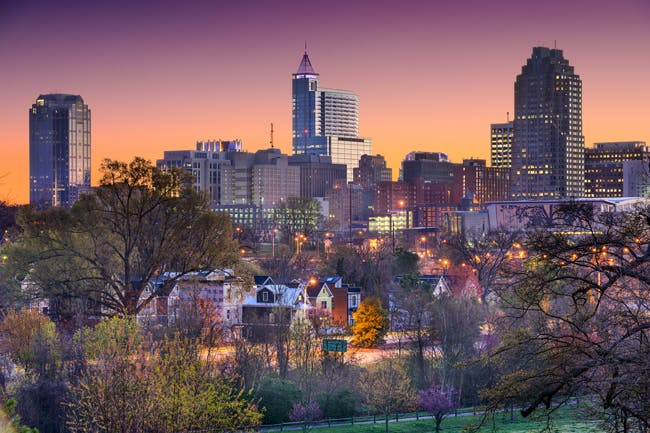
North Carolinians, do you realize how lucky you are? And no, I’m not just referring to your tasty BBQs or your fun-filled state fairs. I’m talking about the quality of life North Carolina offers. For one, you live in a state where the average commute time (23.6 minutes) is lower than the national average (25.4 minutes). You also enjoy lower living costs than your neighboring states to the north and down south. Let’s also add the fact that North Carolina is a pretty safe place to live with a below-average violent crime rate.
On the other hand, the property crime rate in North Carolina is still slightly above the national average. Although the number of property crimes committed in the state is declining, you should not ignore the fact that there’s a 1 in 36 chance that you’ll become a victim of a property crime. That being said, it is highly-recommended North Carolina residents get a security system from a trusted security company.
Security System Provider Requirements in North Carolina
So how can you find a trusted security company? Start by looking for companies that adhere to North Carolina’s state government guidelines. Understanding the guidelines make it easier to determine which companies are trustworthy and therefore more likely to get a response from your local police department when the alarm goes off.
Regulations and guidelines vary from one state to another. Some impose strict rules while others are a little more lenient. North Carolina is somewhere in the middle. All alarm companies are regulated by the North Carolina Alarm System Licensing Board. According to the Board, all individuals and companies who wish to perform services related to burglary and fire alarms must secure a North Carolina Alarm Systems License. The person or company applying for a license has to meet the requirements imposed by the Board, such as having a clean criminal record and at least two years of experience in the alarm industry. Performing installations, providing service, repairs, or monitoring systems all count as experience.
In addition to the Alarm System License, the company must have at least one employee licensed to do electrical work, specifically for low-voltage. The license can be acquired from North Carolina State Board of Examiners of Electrical Contractors(NCSBEEC).
Before signing a contract with any alarm company, be sure to check that the company is properly licensed. Also, check to see whether the technician they will send to install your system is licensed by the NCSBEEC.
North Carolina Security Camera Laws
In addition to a security system, we recommend getting security cameras for further protection. But a question comes to mind: Does North Carolina have any regulations regarding security cameras?
The answer is yes. North Carolina’s Electronic Surveillance Act, which is a shadow of the Federal Electronic Communications Privacy Act of 1986, prohibits the interception of conversations without the consent of at least one party. This only covers audio interception, which means if your camera isn’t recording any audio, you’re not in trouble. If, on the other hand, your camera records audio and video, be sure to let people know they are being recorded.
Although there are no laws that directly govern the use of cameras that only record video, it doesn’t hurt to be a little cautious. One thing you should be mindful of is whether your cameras are invading people’s privacy or not. If you have cameras positioned outside your house, make sure they are not directly pointed at your neighbor’s window or other private spaces. For your indoor cameras, it is wise to put them where guests can easily see them. It is also strongly recommended that you do not place cameras in bedrooms (even your own) to avoid accidentally spying on someone. And of course, it is important to remember that you’re setting up security cameras for protection, not to watch what your neighbors or guests are doing at night.
Safety During Natural Disasters
Aside from property crimes, North Carolinians must watch out for natural disasters. Three natural disasters are known to affect the area frequently: hurricanes, tornadoes, and floods.
North Carolina sits in the direct path of hurricanes that form in the Atlantic. Every year, between June and November, the state is prone to hurricanes. While there’s nothing we can do to prevent gusty winds from blowing and heavy rains from falling, you can at least prepare yourself and your home to prevent the damage hurricanes may cause. Brace your windows with storm shutters or plywood boards, secure objects outside, and ensure that your roof can survive gusty winds before the hurricane season starts.
Hurricanes often cause floods as well. If you live in a low-lying area, always be ready to evacuate. Prepare an emergency kit that includes food and water supply for a few days, clothing, medicines, flashlights, and batteries. You should also prepare an evacuation plan and discuss it with your family members. Make sure everyone understands the plan in case they get separated while evacuating. Keep in mind that floods are one of water’s most destructive forms, so don’t try to fight it. The best you can do is run as fast and as far away from it as you can.
Unlike hurricanes and floods, tornadoes can occur at any time of the year, although the peak season is March through May. More frighteningly, tornadoes usually come with little to no warning. Because of this, North Carolina residents should ALWAYS be prepared. You can’t beat a tornado, so the best thing to do is to take shelter. If possible, build a storm shelter. The second best option is to hide in a basement. Aside from the danger caused by strong wind, you should also watch out for falling debris. During a tornado it’s wise to cover your head with your arms, blankets, or anything that can cushion the damage of falling debris.
North Carolina is a beautiful state where you can truly enjoy it all, if you know how to stay safe. With the right security system, proper education on how to stay safe during natural disasters, and a dash of common sense, you can do it.

